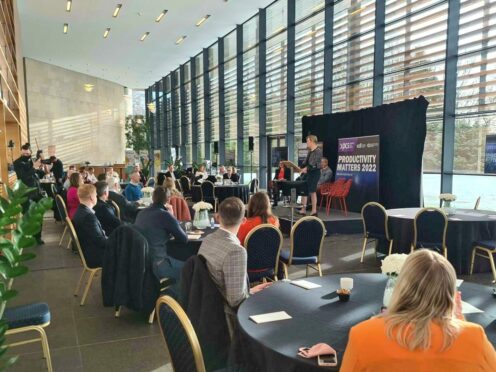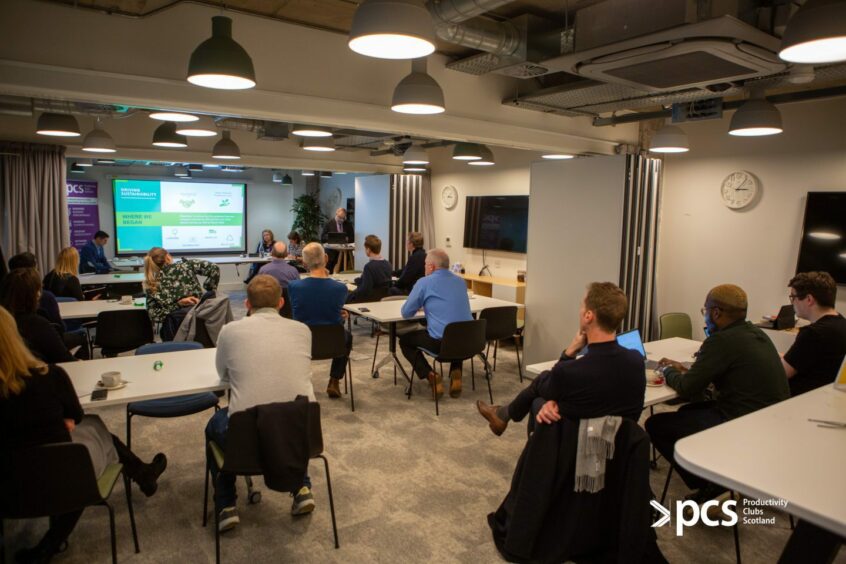A new Productivity Club in Scotland’s Tayside region will be launched this month to help organisations become better at what they do.
-
Some Courier online content is funded by outside parties. The revenue from this helps to sustain our independent news gathering. You will always know if you are reading paid-for material as it will be clearly labelled as “Partnership” on the site and on social media channels,
This can take two different forms.
“Presented by”
This means the content has been paid for and produced by the named advertiser.
“In partnership with”
This means the content has been paid for and approved by the named advertiser but written and edited by our own commercial content team.
The recent energy price increase is just one of many challenges facing small businesses and voluntary organisations. Barely recovering after the difficulties caused by the Covid-19 pandemic, they’re now dealing with supply chain disruption, increased cost of doing business and staff shortages.
But there are organizations that provide much-needed help for small businesses in Scotland. One of them is the Scottish Council for Development and Industry (SCDI), a coalition of public, private and civil society groups working across different regions.
Among SCDI’s initiatives is the formation of Productivity Clubs across the country. The clubs are networks of businesses that provide support for one another to increase their performance. In partnership with the Scottish Government, they are part of a wider effort to address Scotland’s low productivity as outlined in the National Strategy for Economic Transformation (NSET).
Why should SMEs join a Productivity Club?
Here are some reasons why small- and medium-sized enterprises (SMEs) should join a Productivity Club:
1. Membership, activities and resources are free of charge.
2. Regular events provide plenty of opportunities to expand your network of contacts.
3. Meet business peers keen to improve their performance and collaborate.
4. Find an avenue to discuss common business challenges.
5. Come up with practical solutions to problems with help from peers and experts.
6. Build confidence by getting support from business peers.
Eleonora Vanello, Productivity Club programme manager, says:
Even small changes in how we do things can have big impact on raising productivity. Club members across Scotland are reaping the rewards of improvements based on what they’ve learnt at our clubs. As well as hearing from experts and sharing real-life case studies, attendees can expect to learn from one another in group discussions and leave with practical tips to improve performance. Those joining us will be able to discuss their challenges in a safe and supportive environment.
Productivity Clubs across Scotland are growing
There are now around 1,800 members of Productivity Clubs from various industry sectors across Scotland. Since they were launched in 2019, the clubs have hosted more than 130 businesses at over 65 online or in-person meetings to discuss relevant topics like digital transformation, fair work and achieving net zero.
The clubs are in four regions: central and south Scotland, north-east Scotland, the Highlands and Islands.
Launch of Tayside club to focus on business purpose
A fifth club covering the Tayside region will be launched on September 28. The Tayside club will help SMEs in Angus, Dundee, Perthshire and north Fife.
The launch will focus on ‘business purpose’ – the reason an enterprise exists, the fuel that drives its strategy, activities and revenues.
According to a recent Business Purpose Commission report, businesses need to embrace a purpose to ‘find profitable solutions to the problems of people and the planet.’ Focusing on business purpose can help deliver economic prosperity while achieving social wellbeing and environmental sustainability. It also allows businesses to attract and retain employees and customers, and to build trust in Scotland and the rest of the world.
Richard Lochhead, Minister for Just Transition, Employment and Fair Work, will lead the speakers at the event. Dr Faisal Ghani, CEO and founder of SolarisKit, and Tim Hartley, delivery lead of Scotland CAN B, will also share their experiences and discuss what organisations can do now to become more purposeful and grow in the future.
The Tayside club’s launch will be held in partnership between SCDI and Dundee and Angus College.
Caryn Gibson, the college’s economics partnership manager says:
We are delighted to join forces with SCDI to host this event and are thrilled that SCDI are launching their fifth business club here in Tayside. There are many challenges ahead for our business community and it has never been more important for businesses to truly understand their purpose so that despite the challenges they can remain resilient and continue to build for the future. Dundee and Angus College are committed to supporting businesses across our region and we very much look forward to working closely with SCDI as they build their network here in Tayside.
The event will start with a networking lunch at 12.00 PM at the Dundee and Angus College Training Restaurant.
Sign up to join the Tayside Club launch for FREE and learn more about purpose-driven businesses.












